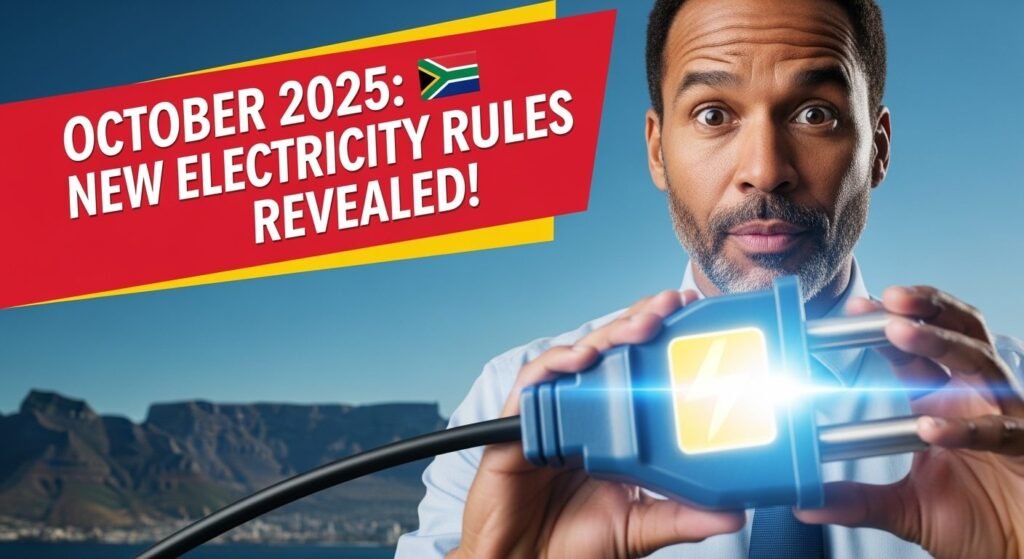South African Electricity Laws: As we approach October 2025, I’ve been closely following the government’s announcements regarding new electricity regulations that will affect every household in South Africa. The Department of Energy has recently unveiled a comprehensive set of rules aimed at addressing the ongoing energy crisis while promoting sustainable consumption patterns. These new electricity laws will require all South Africans to adapt their daily habits and make significant changes to how they use and manage electricity. Are you prepared for these sweeping changes that will transform our relationship with energy?

What Are The New Electricity Regulations?
The new South African electricity laws coming into effect in October 2025 introduce several mandatory requirements for all citizens. At their core, these regulations aim to reduce national energy consumption by 30% within five years. Every household will be required to install smart meters that communicate directly with the national grid, allowing for real-time monitoring and management of electricity usage. Additionally, all homes must undergo an energy efficiency audit, with properties falling below the minimum efficiency rating facing potential penalties. The most controversial aspect involves mandatory load limitation devices that will automatically restrict power during peak periods, ensuring more equitable distribution across the grid.
I’ve noticed that these regulations also include financial incentives for compliance. Households that meet efficiency targets will receive rebates on their monthly bills, while those exceeding their allocated consumption limits will face significantly higher tariffs. Have you considered how these changes might affect your monthly budget?
Why These Changes Are Being Implemented
The government’s decision to introduce these new electricity laws stems from several critical factors affecting South Africa’s energy landscape. First and foremost is the continued strain on the national grid, which has resulted in persistent load shedding over the past decade. By regulating consumption more strictly, authorities hope to create a more stable and reliable electricity supply. Climate change commitments also play a significant role, as South Africa has pledged to reduce its carbon emissions by 42% by 2030. These regulations represent a practical step toward meeting those international obligations.
Another driving factor is the aging infrastructure of the national grid. Rather than solely focusing on expanding generation capacity, these laws aim to manage demand more effectively, reducing the immediate need for costly infrastructure investments. The government estimates that successful implementation could save over R50 billion in infrastructure costs over the next decade while creating thousands of jobs in the energy efficiency sector.
How To Prepare For The New Regulations
I recommend starting your preparation well before the October 2025 deadline to avoid last-minute scrambling. Begin by conducting a preliminary energy audit of your home to identify major inefficiencies. Common issues include poor insulation, outdated appliances, and inefficient heating and cooling systems. Replacing high-consumption appliances with energy-efficient models can significantly reduce your electricity usage and help you stay within the new consumption limits.
- Install LED lighting throughout your home to reduce lighting consumption by up to 80%
- Consider solar water heating systems, which can reduce electricity bills by 30-50%
- Upgrade to energy-efficient appliances with high energy star ratings
- Improve home insulation to reduce heating and cooling requirements
You should also familiarize yourself with the smart meter system that will be installed in your home. These devices provide detailed information about your electricity usage patterns, helping you identify opportunities for further reduction. Many South Africans are already exploring home solar solutions as a complementary measure to reduce their reliance on grid electricity.
When Will These Changes Take Effect?
The implementation of these new South African electricity laws will follow a phased approach beginning in October 2025. The government has outlined a clear timeline to ensure a smooth transition. During the first three months, all households will receive their smart meters and load limitation devices, with installation prioritized in urban areas experiencing the most severe electricity constraints. By January 2026, the energy efficiency audit program will commence, with property owners given a 12-month grace period to implement necessary improvements before penalties take effect.
I’ve learned that the tariff changes will be gradually introduced starting April 2026, with full implementation by October 2026. This phased approach aims to give South Africans sufficient time to adapt their consumption habits and make necessary investments in energy efficiency. The government has also established a dedicated helpline and website where citizens can access detailed information about the regulations and available support programs.
Real-World Impact Assessment
In a pilot program conducted in Cape Town’s southern suburbs during 2024, 500 households were equipped with smart meters and load limitation devices similar to those proposed in the new regulations. The results were promising, with an average reduction in electricity consumption of 23% across participating homes. Most notably, 78% of participants reported that after an initial adjustment period of approximately six weeks, they hardly noticed the limitations on their daily activities. This suggests that while the transition may initially feel restrictive, most South Africans will likely adapt quickly to the new electricity laws.









